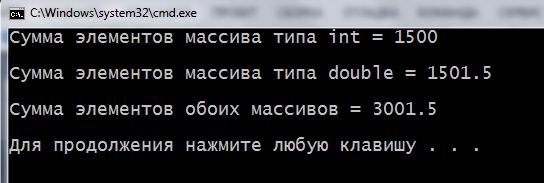Perhaps, someone from beginners scares the topic title “Function overloading”? Scares me. It seemed – It is something, what have long to understand. Actually, function overloading is very easy to understand. There is nothing complicated.
Overloaded functions – this function, that have the same name, but differ in the number of accepted parameters or types. Or – both.
To start to define what is the essence of the use of overloaded functions. It consists in the fact, you can give the same name functions. When this, they may be performed in various ways and various types of return values.
For example, function should take an array of numbers and return the program to the sum of its elements. But we can pass in an array of function int or type double. In this case we can not provide different functions names. They're essentially performing the same work, just use different data types.
The following program defines three overloaded functions namedsumElements(). All of them calculate the amount of array elements. One takes an array type int and its size. The second takes an array type doubleand its size. The third takes two array type elementsint anddoubleand their size.
1 2 3 4 5 6 7 8 9 10 11 12 13 14 15 16 17 18 19 20 21 22 23 24 25 26 27 28 29 30 31 32 33 34 35 36 37 38 39 40 41 42 43 44 45 46 47 48 49 50 51 52 53 54 55 56 57 58 59 60 61 | #include <iostream> using namespace std; int sumElements(int arrI[], int size); double sumElements(double arrD[], int size); double sumElements(int arrI[], double arrD[], int size); int main() { setlocale(LC_ALL, "rus"); const int Size = 5; int ArrInt[Size] {100, 200, 300, 400, 500}; double ArrDouble[Size] {100.1, 200.2, 300.3, 400.4, 500.5}; cout << "Сумма элементов массива типа int = "; cout << sumElements(ArrInt, Size); cout << endl << endl; cout << "Сумма элементов массива типа double = "; cout << sumElements(ArrDouble, Size); cout << endl << endl; cout << "Сумма элементов обоих массивов = "; cout << sumElements(ArrInt, ArrDouble, Size); cout << endl << endl; return 0; } int sumElements(int arrI[], int size) { int sumElArr = 0; for (int i = 0; i < size; i++) { sumElArr += arrI[i]; } return sumElArr; } double sumElements(double arrD[], int size) { double sumElArr = 0; for (int i = 0; i < size; i++) { sumElArr += arrD[i]; } return sumElArr; } double sumElements(int arrI[], double arrD[], int size) { double sumElArr = 0; for (int i = 0; i < size; i++) { sumElArr += arrI[i]; sumElArr += arrD[i]; } return sumElArr; } |
Definitions of overloaded functions are located in the strings 31 – 61. They create a variable to store the sum of the values of the array elements. In a for loop the amount of accumulated. Next, the resulting value is returned to the program, to place a call to an overloaded function.
Title to all three functions performed by one and the same name – strings 17, 21, 25. Passed to the function when calling an array of type int, and its size, the compiler will automatically detect, which of the three overloaded functions it is necessary to use. Similarly occur during call other functions.
The most important role in overloaded functions it plays a parameter list. It is also called a signature function. In order to use overloaded functions their signature must be different. Otherwise, the compiler will not be able to determine, what kind of function you want to use in a particular case,. That is, in the signature must be different number of parameters, types, or both, and the second.
How not to do:
With this announcement, even considering the fact, function that return data with different types of, and what the parameter names are different, the compiler can not determine which of the two functions cause. These signatures are identical in type and number of parameters. Therefore, these functions can not be overloaded.
Watch a short video about the overload:

